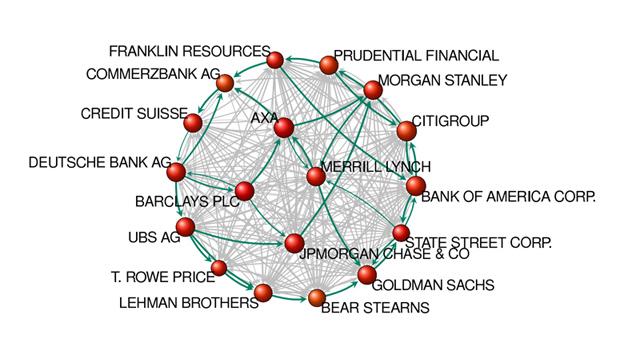
by Andrew Gavin Marshall
March 25, 2013
from
Occupy Website
|
Andrew Gavin Marshall is an
independent researcher and writer based in Montreal, Canada. |
The Global Power Project, an investigative series produced by Occupy.com, aims to identify and connect the worldwide institutions and individuals who comprise today's global power oligarchy.
By studying the relationships and varying levels of leadership that govern our planet's most influential institutions from banks, corporations and financial institutions to think tanks, foundations and universities this project seeks to expose the complex, highly integrated network of influence wielded by relatively few individuals on a national and transnational basis.
This is not a study of wealth, but a study of power.

Introducing the Global Power
Project
We live in an interdependent world, where nations are increasingly eclipsed
in size and wealth by the major banks and transnational corporations which
have come to dominate the global economy.
Royal Dutch Shell has more money than all but the top 22 countries on earth.
Supra-national and international institutions like the European Central Bank
and IMF punish the populations of Greece, Spain, Portugal, Italy and Ireland
into poverty and conditions of exploitation. Banks and corporations make
record profits while poverty soars, debts increase and hunger spreads.
Half the world’s population lives on less than
$3 per day, over 1 billion people live in slums, and a global land grab
coupled with a six-year-long global food crisis is pushing populations off
their land and into deeper poverty and extreme hunger.
Western governments impose “austerity” at home while waging wars and
supporting dictatorships abroad.
Across the Arab world populations have been in
revolt, labor unrest in South Africa reveals the persistence of economic
apartheid, and popular resistance has exploded across southern Europe, while
student uprisings have shaken Britain, Chile, Quebec and Mexico.
Indigenous peoples in the western hemisphere are mobilizing and resisting
the destruction of the natural world, from Ecuador, Brazil, Guatemala and
Mexico to Canada.
The Occupy Movement emerged as a reaction to the
rapacious system of global power that has impoverished the world, devastated
the environment, waged wars and, in the past few decades, emerged as a
highly integrated global class of oligarchs.
It is within this context that Occupy.com is beginning a research project to
examine the networks of global power and how they operate, providing a
resource to activists and others who wish to engage in opposition to the
global power structures as they currently exist. This initiative is the
Global Power Project.
The aim of the Global Power Project is to map the connections between the
world’s dominant institutions of power, by examining the relationships and
points of cross-over among the individuals who direct these institutions.
The institutions that will be examined include the major banks, central
banks, oil companies, mining corporations, media conglomerates, major think
tanks, foundations, university boards and other international organizations.
The aim is to expose not only the revolving door between government and
private institutions, but to name names and directly call out the global
elite based on their affiliations and networks of influence.
The first installment of the Global Power Project will examine six major
American banks:
-
JPMorgan Chase
-
Goldman Sachs
-
Bank of
America
-
Wells Fargo
-
Morgan Stanley
-
Citigroup
Executives, board members and major advisers to
these institutions will be studied, with information drawn from their
official CVs, biographies, published interviews or financial publications,
and collected into a detailed appendix outlining the individuals' past and
present affiliations with other dominant institutions of power.
This includes examining the links between those who manage the big six banks
and government agencies, universities, think tanks, foundations,
international organizations, the media, multinational corporations and other
organizations.
From the data collected, we will be able to draw
conclusions about the networks of influence and the shared leadership
positions that enable these banks and bankers to wield significant influence
over other institutions.
This is not a study of economic dependence or the investments made by banks.
It is a study of the social organization, interaction and integration of
national and global elites.
Instead of viewing institutions as separate
entities, and often in opposition to one another as it is commonly
suggested, the Global Power Project will seek to document the increasingly
globalized connections that bind the financial and political elite, and to
expose this highly integrated network of individuals spread across an array
of institutions both national and global.
The Global Power Project does not adhere to a particular ideological view,
philosophy or dogma.
Rather, it focuses on the facts: by examining
the connections, affiliations and cross-memberships through which elites
govern our dominant social, economic and political institutions.
From this research we hope to offer a clearer
understanding of the current networks and structures of global power, which
can serve as an invaluable resource for those seeking to study, understand,
expose or challenge those existing structures.
The initial, forthcoming installment in the Global Power Project will
focus on the major Wall Street banks, studying their executive leadership,
members of the boards of directors, international advisory boards and other
key officials operating within those institutions.
Keep a lookout and spread the word.
The mapping of networks of global power
is about to begin.
Contents
-
Exposing The Transnational Capitalist
Class
-
Identifying The Institutions of
Control
-
The Influence of Individuals and
Family Dynasties
-
Banking on Influence with JP Morgan
Chase
-
Banking on Influence with Goldman
Sachs
-
Banking on Influence with Bank of
America
-
Banking on Influence with Citigroup
-
Banking on Influence with Wells Fargo
-
Banking on Influence with Morgan
Stanley
-
Transcanada Corporation, Kings of The
Keystone Pipeline

